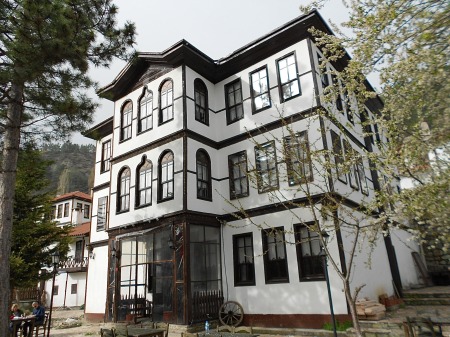Modern Turkey has accommodation to suit all tastes and budgets, with what’s on offer at the top end of the market increasingly world class in quality. Life is getting tougher for budget travellers though since these days almost no one opens a new hotel with less than three stars.
Hotels are required by law to post their prices prominently in reception and although they can charge less than these prices they cannot charge more. Infuriatingly, most hotels in the areas visited by foreign tourists charge in euros, dollars, sterling or whatever currency suits them. This is perfectly legal but has disastrous consequences for domestic tourists who find themselves increasingly priced out of holidaying in their own country.
Booking.com is not allowed to operate in Turkey. You can use it to book accommodation OUT of the country but not in it (although using a VPN gets round this problem, of course).
Boutique hotels
Some of Turkey’s finest places to stay are true boutique hotels: small one-off places usually run by their owners and often in historic buildings. Unfortunately as hoteliers have cottoned on to the popularity of such offerings so the word “butik” has started to crop up in the names of hotels that are anything but.
For more than a decade the Bible of the boutique hotel movement has been The Little Hotel Guide compiled by Müjde and Mutlu Tönbekici. Pick up a copy to drool over pictures of places you may have no chance to stay in.
There are especially large concentrations of boutique hotels in İstanbul, Bozcaada, Alaçatı, Bodrum, Antalya and Cappadocia but these days they crop up in some of the most out-of-the-way places too. Very few towns don’t have at least one Ottoman house hotel (Tokat is one glaring exception to the rule).
Although most boutique hotels are perfectly comfortable the emphasis is often more on the character of the building (or the owner) or the beauty of the location. Turkey’s most remote boutique hotel is probably the Savşat Karagöl Otel in the Şavşat Meşeli National Park, its most luxurious the Casa del’Arte in Torba, near Bodrum, or the superb Mehmet Ali Ağa Konağı in Reşadiye, near Datça.
Boutique hotels are usually classified as “özel (special)” hotels which means that they don’t have to provide the specific amenities required in starred hotels. Breakfasts are often a big deal although few boutique hotels rise to actual restaurants.
Read more about staying in old Ottoman house-hotels: Staying in an Ottoman Hotel
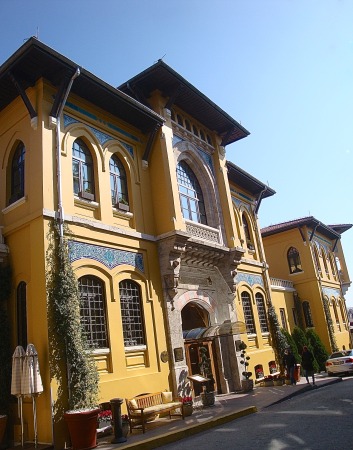 Four Seasons Sultanahmet, İstanbulFour and five-star chain hotels
Four Seasons Sultanahmet, İstanbulFour and five-star chain hotels
At the luxury end of the market all the big players are represented, especially in İstanbul where even those that aren’t already there are eyeing up sites or in the process of building new hotels. Ankara and İzmir also have their fair share of pricy chain hotels but recently some of the chains have started to branch out and look at sites around the country. Hiltons, Marriotts, Sheratons, Ramadas, Hyatts and Novotels now crop up in some very unexpected places (Hilton in Avanos, Ramada in Kahramanmaraş, Novotel in Trabzon).
Hiltons, Sheratons and Novotels may be much of a muchness but some of the chains offer more interesting accommodation to the traveller with deep pockets. In particular in İstanbul the two Four Seasons hotels (one in a converted prison in Sultanahmet, the other in a minor imperial palace on the Bosphorus) offer wonderful rooms in great and historic locations, while the W Hotel is a hip hotel-meets-Ottomania one-off housed in buildings that once housed the staff of the Dolmabahçe Palace. The Çırağan Palace Kempinski Hotel also offers the ultimate in luxury right beside the Bosphorus in a partially historic building, albeit one that has had to be reconstructed.
In all these hotels absolute comfort is assured although you must expect to pay for “extras” such as wireless Internet access and breakfast that are thrown in as normal in three-star hotels. Most of these hotels compete with each other to offer the most stunning spas and the best restaurants. Several have indoor and outdoor swimming pools too. Most have fully-equipped business centres as well.
Specifically Turkish chains to look out for include the many Dedemans and Marmaras, and a handful of Divans.
All-inclusive hotels
A growing number of all-inclusive hotels are springing up along the Mediterranean coast, especially around Antalya, Kemer and Belek. Most are enormous and, like cruise ships, aim to offer something for everyone, especially when it comes to choice of food. Some are aimed at families, some at keen golfers (especially around Belek). A few cater to the Islamic market specifically (“halal” hotels). Many of these hotels are themed (for example, the Adam and Eve Hotel at Belek).
Prices are usually very competitive but this is not a form of tourism that is likely to appeal to everyone.
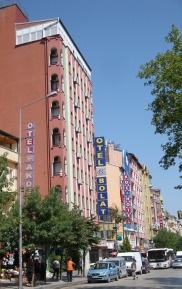 Three-star hotels
Three-star hotels
Travellers looking for comfort, cleanliness and security at more reasonable prices than those at the chain hotels will be pleased to learn that there are good three-star hotels in almost every Turkish town. These hotels offer private bathrooms, sometimes with a tub, usually with a shower, that come equipped with towels, toiletries and hair driers. There will probably be a fridge and perhaps a safebox in the room. There will always be a television, usually large, wall-mounted and multi-channelled. Usually there will be functioning air-conditioning/heating too. Breakfasts will come with a choice of hot and cold dishes, and of tea or coffee. The more out of the way you are, the fewer luxuries you should expect. Avoid if you can hotels with centrally controlled heating or air conditioning as this makes it very hard to regulate the temperature in your room to suit your own preferences.
Two-star hotels
If you’re trying to economise there are also plenty of two-star hotels (although increasingly they are being upgraded to three stars) which offer many of the same amenities although often in less good working order. Decor in some of the two-star hotels can sometimes be a tad off-putting. Breakfasts will be good enough although you’ll soon tire of a diet of bread, cheese, tomatoes and cucumber washed down with stewed çay.
One-star hotels
Increasingly hard to find, one-star hotels are sometimes almost as good as two stars and sometimes not much better than hostels. You may appreciate the cheaper rates but don’t expect too much in the way of cosseting.
Pensions (Pansiyon)
In some of the resort areas popular with independent travellers you will find lots of small family-run pensions which share some of the characteristics of boutique hotels but without the claims to history, natural beauty etc. Selçuk, Kuşadası, Cappadocia and Antalya, in particular, still have plenty of keenly-priced pensions that usually often a range of services wanted by independent travellers ranging from laundry facilities and book exchanges to tours and onward travel advice.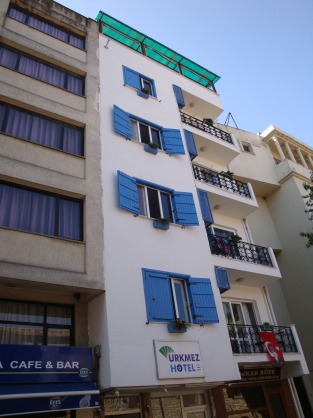 Small hotel? Pension? In Turkey there’s not always much difference. Selçuk
Small hotel? Pension? In Turkey there’s not always much difference. Selçuk
When Turkish tourism was in its infancy there also used to be a lot of ev pansiyonları which were basically spare rooms in private homes. Today these just about hang on in a few remote places such as Uzundere, near Tortum. Usually, though, they are a short-lived first step towards becoming full-blown pensions.
Hostels
Given the low prices of most pensions it’s perhaps not surprising that there aren’t many places where you can still find proper hostels with dormitories. Only İstanbul really offers a choice of hostels which may be the only option for single travellers in particular who don’t want to have to pay the city’s high hotel prices. Even then most of the hostels also offer private rooms as well as dorms for those who want to escape the noise and disruption of sharing with other people.
Home-stays (ev pansiyonları)
Home-stays are one of the buzz words of the eco-tourism movement and certainly offer a great opportunity to get to grips with a country more intimately than when you stay in an official hotel. That said, one should not under-estimate the additional effort required on the part of the visitor. Hosts and hostesses won’t necessarily share your language and privacy may be in short supply. On the other hand, the food on offer will usually be good and interesting and you may come away with a better idea about how people actually live in remoter parts of Turkey.
In the early days of tourism there were a lot of ev pansiyonları, basically spare rooms in people’s houses, but today few survive and it is not easy to get permission to offer such accommodation. But Turkey does have a couple of really excellent home-stay options, the first at Yuvacalı, near Şanlıurfa in the south-east, the other at Savur, north-east of Mardin. They could hardly be more different. Yuvacalı is a small rural community where you get a chance to share in simple rural life, while Savur is a stone-built mini-Mardin and the Abdullah Paşa Konağı houses some of the most beautifully decorated rooms in the country.
Read more: In Mardin: To Home-Stay or Not to Home-Stay?
Öğretmen Evleri
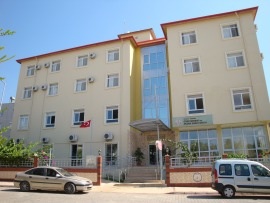 In out of the way places where there is no decent accommodation one option has always been to put up at the local Öğretmen Evi (Teacher’s House), an especially useful option for lone women. Traditionally Öğretmen Evis were fairly simple places with cleanliness and respectability their main advantages. Some continue in that same vein although increasingly they are being modernised, upgraded and made more generally available to the irritation of hoteliers who see their tax-free status which allows them to offer lower prices as unfair competition. Their modernisation will remind some people of the modernisation of youth hostels: some will welcome the greater comfort, others will mourn the inevitable rise in prices.
In out of the way places where there is no decent accommodation one option has always been to put up at the local Öğretmen Evi (Teacher’s House), an especially useful option for lone women. Traditionally Öğretmen Evis were fairly simple places with cleanliness and respectability their main advantages. Some continue in that same vein although increasingly they are being modernised, upgraded and made more generally available to the irritation of hoteliers who see their tax-free status which allows them to offer lower prices as unfair competition. Their modernisation will remind some people of the modernisation of youth hostels: some will welcome the greater comfort, others will mourn the inevitable rise in prices.
Occasionally, as in Arpaçay, the Öğretmen Evi may be the only place to stay. Sometimes the Öğretmen Evis are in good central locations (think Çanakkale or Niksar), sometimes they’re tricky to track down. Some are almost always booked up (think Mardin), others rarely see a visitor. Sometimes you won’t be able to find a bed because visiting dignitaries are occupying them all.
Öğretmen Evis were originally designed to provide cheap holiday homes for under-paid teachers. Similar places exist to serve other government professions and it is likely that they too will become increasingly widely available as the government looks for new sources of income.
Couch-surfing
For those whose budgets really are rock-bottom another option is couch-surfing (www.couchsurfing.org) which involves putting up on whatever spare bed, couch or floor space a local feels able to offer. After a slow start this seems to be working well in Turkey to judge by the satisfied comments of the couch-surfers I’ve talked to.
Airbnb
Airbnb (www.airbnb.com) is an international movement that purported initially to offer travellers the chance to stay in spare rooms in private homes. While very popular with users, it is an increasingly controversial option which has forced up rents in historic town centres and taken a lot of apartments out of use for residents. Because of this I am unable to recommend using it. In Turkey some rooms offered on the Airbnb site appear to be normal hotel accommodation. Only a few places are genuinely spare rooms in places where you get to meet the owner.
Read a light-hearted take on occasional hotel problems: The Hotel Experience
